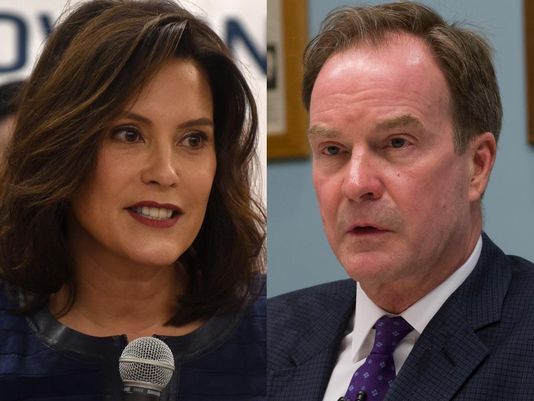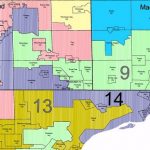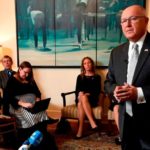With a prized political possession on the line in 2018 – an open seat for Michigan governor – voters appear unenthusiastic about any of the 12 Republican or Democratic candidates vying for the state’s highest office.
A new poll by Lansing-based EPIC-MRA found that all of the contenders to succeed term-limited Republican Gov. Rick Snyder may have a long way to go to win election in November.
The Republican frontrunner, Attorney General Bill Schuette, has an anemic rating in this survey with 24 percent of voters saying they have a favorable opinion of him, while 19 percent give him an unfavorable mark. At the same time, 35 percent have no opinion.
The Democratic frontrunner, former state Senate Minority Leader Gretchen Whitmer, continues to lag dangerously behind in name identification among statewide voters. Two-thirds have never heard of her.
Past statewide polls have demonstrated similar results but we are now just five months out from the August primaries. This is not about the campaigns’ preliminary jockeying or an early concentration on lining up donors and endorsements – the voters are saying they are not impressed with any of these candidates.
That is rather extraordinary. Over the past 28 years, Michiganders have known just three governors – Republican John Engler, Democrat Jennifer Granholm and Snyder — yet the 2018 transitional election, with additional open seats at the top of the ticket for attorney general and secretary of state, seems to have generated little enthusiasm among Republican or Democratic voters.
Schuette may have the clearest path to an election win, but his warm embrace of 2016 candidate Donald Trump and now President Trump – who endorsed the AG months ago — could present significant hurdles in the fall general election. The EPIC-MRA survey found that the president’s lopsided job approvals in Michigan stands at 37 percent positive, 60 percent negative.
As for voters’ overall opinion of Trump, only 36 percent like him while 55 percent do not – including 45 percent who say they have a “very unfavorable” view of the president.
Similarly, Schuette’s main competitor in the GOP primary, Lt. Gov. Brian Calley, must grapple with the poor public viewpoint of his political teammate, Snyder. The new poll shows Snyder’s ratings continue to follow a familiar pattern established more than two years ago, as the outgoing governor’s job approval with voters stands at just 39 percent.
On the other side of the partisan ledger, Whitmer scored a victory this week when Detroit Mayor Mike Duggan endorsed her candidacy. But that came only after a quiet, unsuccessful effort by Duggan and some other Democratic Party leaders to bypass Whitmer and recruit either U.S. Sen. Gary Peters or Congressman Dan Kildee of Flint as the party’s new standardbearer in the gubernatorial contest.
In the EPIC-MRA survey, just 13 percent have a favorable opinion of Whitmer, an East Lansing Democrat.
One of the most bizarre aspects of the poll is that Democrat Shri Thanedar, who was a complete unknown in Michigan politics less than a year ago, is recognized by more voters (53 percent) than Calley (41 percent), who has served as the state’s lieutenant governor for the past seven-plus years.
Thanedar, an Ann Arbor high-tech entrepreneur, launched a series of TV ads starting in December, including on Super Bowl Sunday, that focused solely on getting voters accustomed to his hard-to-pronounce name. Political pros panned the effectiveness of the TV spots but, $1.2 million later, it appears that they successfully boosted his name ID.
The Feb. 24-27 poll—did not bother poll-testing the obscure candidates, including eight minor party hopefuls. Dr. Abdul El-Sayed, former director of the Detroit Health Department, who is butting heads with Thanedar for support among the left-wing of the Democratic Party, is unknown to more than two-thirds of the Michigan electorate. The first-time candidate’s favorable/unfavorable ratings in the poll were even at 7 percent each.








A Whitmer vs Schuette showdown, would give us the same lackluster choices as the Trump v Hillary POTUS 2016 Race and Voters clamoring for a NOTA (None Of The Above, we need a do-over) Ballot option! Shri wins over any and all Democrats that actually hear him, just as Patrick Colbeck gains ground (the Grassroots favorite) with every Group he speaks before also (which is why Schuette is ducking the Townhalls all across the State and hopes no-one pays them any attention). Both Whitmer and Schuette hope that time runs out with them both in their “nominee by default” status wins in August. If the Election were in 2019, neither would/could survive.
Paul and AJ, I still think it”s more likely the team moves in another direction than Favors simply because it makes it easier to run Snyder”s offense. But I don”t believe it”s certain and it all but was a month ago. My own position has always been that the best way to truly contend is to find a new formula rather than to try to adopt someone else”s formula. What are the chances the Jazz will become a better four-out offense than the Warriors or Rockets even if they bring in a quality stretch four? I”d rather they develop their own advantage with two bigs and dominate the offensive glass, lock things down defensively, and (they really need to improve here) rely on lots of deep entry passes to guys who have sealed smaller defenders right under the rim. Someone will win a title without playing the Warriors”s style of ball. The question is when and who.